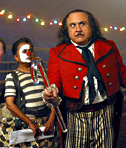
Movie Guru Rating:

Comment
on this review
| |

Big Fish is all gloop, no guts
by Jesse Fox Mayshark
Tim Burton is a softy. He always has been. He likes oddballs and misfits, but sweet ones: Pee-Wee Herman in Pee-Wee's Big Adventure, Winona Ryder's good-hearted goth-child in Beetlejuice, the hapless but lovable title characters of Edward Scissorhands and Ed Wood.
But in his better movies, his sentimental tendencies are offset by his taste for the gross and grotesque. Beetlejuice has Michael Keaton's madcap malevolence; Ed Wood has Martin Landau's decaying Bela Lugosi; and Pee-Wee Herman, of course, provided his own ancillary weirdness.
Big Fish is another trip to Burton's gothic candyland, but this time he leaves the monsters at home under the bed. For all its familiar Grimmness—a giant, a witch, haunted woods—the movie is mush from start to finish. Ostensibly a story about a young newspaper reporter (Billy Crudup) coming to terms with his dying father (Albert Finney), Big Fish is really striving for something grander: an affirmation of imagination, a paean to the power of stories and storytellers. But it's as blubbery and fake as the mammoth digitized catfish that serves as its title character and central metaphor.
Large chunks of the film are picaresque tall tales related by Finney's character, Edward Bloom, to his son, daughter-in-law, and anyone else who will listen. Bloom (played in flashbacks by Ewan McGregor) has a story for every occasion, the less plausible the better. His adventures unfold in a recognizable Burton world, a magic realist Americana full of sunny Main Streets and foggy nights. It's the sort of place where an Eisenhower-era town is terrorized by a giant who lives in a cave and ventures out at night to eat the local livestock.
The problem for Will (Crudup) is that these stories are all he actually knows about his father, a traveling salesman who was away more often than not. Now bedridden with cancer, the elder Bloom clings to his personal mythology and resists his son's entreaties to tell him "the truth" about his life. Will somehow never thinks to ask his mother (Jessica Lange, in the sort of thankless "mother" role that actresses of a certain age take to pay the bills) her version of his father's stories. But then, this is a movie about fathers and sons; the women who love them—and suffer for it—have no role except doting, unquestioning support.
The family segments of the movie are interesting because they attempt a plainspoken realism unlike anything Burton has done before. There are a few affecting moments, mostly courtesy of Finney; I liked a scene where Lange finds him taking a bath in his pajamas and climbs in with him. Both of them know he'll be dead soon, and all they can think to do is hold onto each other. On the whole, though, little of it rises above the level of competent TV drama.
The fairy-tale elements, meanwhile, are tired and forced. Burton has worked this ground too many times, and there is more cliché than charm in his Southern swamps and Disneyfied folklore. McGregor, as Bloom's idealized version of himself, is stuck in the wide-eyed na�f mode that was wearing thin well before the end of Moulin Rouge.
In putting the film's unwieldy parts together, Burton shotguns an unhappy wedding—never more so than in the predictably gloopy finale, which provides the requisite Very Important Lessons about a life being more than the sum of its actual parts. For a movie about the transformative power of the imagination, it suffers throughout from a surfeit of the same.
Because I can't think of another 200 words to say about Big Fish, let me use the remaining space to recommend a superior (though far darker) modern fairy-tale: Lukas Moodysson's Lilya 4-Ever, now out on DVD (available at netflix.com, if you can't find it at your local videomart).
Set in an unnamed former Soviet republic (it was filmed in Estonia), Lilya is about a 16-year-old girl who, in classic fairy-tale fashion, is effectively orphaned when her mother and wicked step-father-to-be run off to America, promising to send for her later. She moves in with an unsympathetic aunt, whose only real interest is in Lilya's small allowance. Soon she's living on her own, in miserable public housing blocks full of similarly abandoned and neglected kids. Her few moments of joy come from sniffing glue with her friend Volodya, a younger neighbor boy who fantasizes about playing basketball with Michael Jordan.
Bad things happen, and more bad things happen, and keep on happening. Lilya's turn to prostitution is as inevitable as it is sad. The tone is such that when she finally meets her apparent prince—a sweet, handsome boy who promises he can find her a good job in Sweden—you suspect nothing good can come of it. But the performances—especially Oksana Akinshina in the title role—are vivid, as is Moodysson's immersion in Lilya's world. The film concludes with a series of statistics about the sexual exploitation of teenagers in Eastern Europe, but its traces of dreaminess and complex view of reality make it anything but didactic. Moodysson is full of sympathy for his young characters, but—unlike Tim Burton—he refuses to pretend that their fantasies will save them.

January 15, 2003 * Vol. 14, No. 3
© 2000 Metro Pulse
|